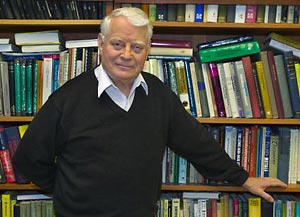UC Berkeley Press Release
Chemical engineer John Prausnitz awarded National Medal of Science
BERKELEY – The nation's highest scientific honor, the National Medal of Science, was awarded this week to the University of California, Berkeley's John M. Prausnitz, professor of chemical engineering and faculty senior scientist at Lawrence Berkeley National Laboratory.
 John M. Prausnitz (Photo by Roy Kaltschmidt/LBNL) |
Prausnitz was one of eight recipients of the 2003 medal, to be presented March 14 at a White House ceremony. President George W. Bush made the announcement Feb. 14 from the White House, also naming the six recipients of the 2003 National Medal of Technology.
Other University of California recipients of the medal are J. Michael Bishop, professor and chancellor at UC San Francisco; and R. Duncan Luce, Distinguished Research Professor of Cognitive Science and Research Professor of Economics at UC Irvine.
An applied physical chemist, Prausnitz has developed molecular thermodynamics - an understanding of the way molecules interact in fluids and solids - for the design of separation operations in large chemical plants to make them more efficient, environmentally friendly and safe, and to reduce energy consumption. The concepts and computer programs he developed have been key to the design of numerous large-scale chemical plants, including petroleum refineries, facilities for the manufacture of polymers, plastics and pharmaceuticals, and industrial-scale production of oxygen from air.
"We look at the molecular properties of the individual molecules and scale up to find out the properties of the fluid or solid, be it water, oil, air or natural gas," Prausnitz said. "This way, we can do calculations that tell us what the molecules will do in a large chemical process."
Prausnitz joined the UC Berkeley chemical engineering faculty in 1955, working closely with chemists in the Department of Chemistry to adapt modern molecular science to the chemical industry. He became one of the main architects of the modern design of chemical manufacturing processes in the United States and abroad, moving away from trial-and-error methods to the use of powerful quantitative prediction methods.
In the petroleum industry, for example, crude oil containing hundreds of different compounds must be distilled into many different products, ranging from gasoline and kerosene to heating oil. The many towers visible at oil refineries are the distillation columns that do this separation. Using the fundamentals of physical chemistry, Prausnitz developed the concepts that allow such large-scale distillation columns to operate without the danger of fires or explosions and without wasting energy or raw materials.
His concepts also are the basis of the design of polymer manufacturing plants, such as those making polyethylene or rubber. He also concentrated on raising the efficiency of air separation into oxygen and nitrogen through distillation at low temperatures. Oxygen has its greatest use in the steel industry and in purification of wastewaters.
More recently, Prausnitz has applied molecular thermodynamics to the biotechnology industry.
"John has pioneered the application of molecular thermodynamics to emerging as well as existing industries," said Harvey Blanch, UC Berkeley professor of chemical engineering. "Over 15 years ago, John recognized the important role that thermodynamics could play in biotechnology. During the course of our subsequent collaboration, John translated advances in molecular thermodynamics from a chemical to a biological context, providing the fundamental underpinnings for many bioprocesses, including bioseparations, enzymatic catalysis and protein stabilization."
Prausnitz has distilled his techniques into two much-used books, the textbook "Molecular Thermodynamics of Fluid Phase Equilibrium," now in its third edition, and the reference book "Properties of Gases and Liquids," now in its fifth edition. A free computer program he created, Unifac, is used widely in the design of chemical manufacturing plants.
Prausnitz also has mentored a generation of engineers and industrialists, supervising 75 Ph.D. students and 35 post-doctoral fellows during his nearly 50-year career. He coauthored with his students the first book on computer calculations of phase equilibrium, predating by at least two decades the widespread use of automated, computer-based physical property prediction. He has authored or coauthored over 600 publications and three pioneering books used by chemical engineers throughout the world.
Prausnitz, 77, was born in Berlin, Germany, in 1928 and became an American citizen in 1944. He obtained his bachelor's degree in chemical engineering from Cornell University in 1950 and his Ph.D. from Princeton University in 1955, the year he joined the UC Berkeley faculty.
Now a Professor of the Graduate School at UC Berkeley, Prausnitz is a member of the National Academy of Sciences and the National Academy of Engineering, as well as a member of the American Academy of Arts and Sciences. He holds honorary doctorates from the University of L'Aquila, Italy, the Technical University of Berlin and Princeton University. Last April he received an honorary doctorate from one of the world's oldest universities, the University of Padua in Italy.
The National Medal of Science - won to date by 26 UC Berkeley faculty - honors individuals in a variety of fields for pioneering scientific research that has led to a better understanding of the world around us, as well as to the innovations and technologies that give the United States its global economic edge. The National Science Foundation administers the award, established by Congress in 1959.
The National Medal of Technology, administered by the Department of Commerce, recognizes men and women who embody the spirit of American innovation and have advanced the nation's global competitiveness.
Links:

